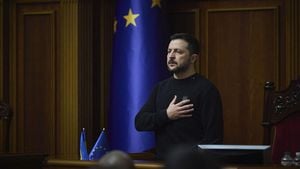Language politics is heating up in India as multiple states grapple with the imposition of Hindi and the preservation of local identities. Recent events have illuminated the fierce tensions surrounding language policies, particularly between Tamil Nadu and Karnataka, with accusations of petty politics and calls for regional pride.
According to reports from India Today, the Vishwa Hindu Parishad (VHP) has proclaimed Hindi as the potential common language for India. VHP joint general secretary Surendra Jain stated, "It is our conviction, and it should be the resolution of the country, to adopt Hindi as the common language." This statement sparked backlash from regional parties like the Dravida Munnetra Kazhagam (DMK), which are accusing the BJP of indulging in divisive tactics.
The language battles are not just confined to political rhetoric; they manifest vividly on the ground. Tamil Nadu is engaged in what appears to be a deep-rooted conflict with the central government over the National Education Policy (NEP) 2020, which many see as an attempt to impose Hindi over regional languages. Education Minister Anbil Mahesh Poyyamozhi accused the Centre of using education funds as means of coercion, claiming they were withholding resources to force compliance with NEP.
Political tensions escalated as Chief Minister MK Stalin's administration demanded immediate release of funds, resulting from the state’s participation—or lack thereof—in the PM SHRI scheme, purportedly aimed at educational improvements. Union Education Minister Dharmendra Pradhan urged Tamil Nadu to embrace the NEP entirely, which was met with stern resistance from the local administration. Stalin countered these claims, positioning himself as the defender of Tamil cultural identity against what many see as Delhi's overreach.
Meanwhile, across the border, Karnataka is facing its own language-related turbulence. Tensions flared recently following incidents of violence relating to language identity, particularly around the contentious Karnataka-Maharashtra border. A KSRTC bus driver faced assault for failing to respond in Marathi, prompting retaliatory attacks on individuals from Maharashtra. This prompted both states to suspend bus services for safety reasons and led to calls for intervention from state leadership.
BJP state president B.Y. Vijayendra urged both Karnataka and Maharashtra to intervene swiftly to maintain law and order. His comments came amid growing unrest, highlighting the volatility of language pride and the political ramifications of these disputes. He voiced concerns over disrespecting local sentiments, asserting, "Kannadigas are strong and cannot be threatened," calling for responsible action from authorities instead of allowing divisive politics to thrive.
The situation has become emblematic of broader issues at play—while political leaders engage deeply with language and identity, pressing issues such as corruption and governance fail to receive necessary scrutiny. Ruling parties utilize these emotional language wars as diversions from accountability on other fronts. For example, Karnataka's Congress government has faced criticism for avoiding tough questions related to allegations of corruption amid the current uproar.
While protests have intensified across both states, the ensuing language wars have dominated headlines and public discourse. Pro-Kannada sentiment has undeniably gained traction, with local activists enforcing laws mandatorily requiring business signage to be predominantly Kannada. Actions have intensified to the point where activists have vandalized non-compliant shop signs, reflecting just how deeply entrenched these linguistic battles have become, blurring the lines between cultural pride, identity politics, and daily societal interactions.
Social media has also played a pivotal role, with the BJP and DMK engaging through online campaigns to rally supporters, reflecting the modern dynamics of political engagement. The Congress party chimed in as well, dubbing the language conflict "silly," hinting at its awareness of the necessity to tap both cultural pride and effective governance.
The escalations have led political analysts to ponder the larger consequences of these disputes. Will they provide meaningful solutions to pressing local issues or merely continue fanning the flames of division? With the stakes so intertwined with identity and pride, the language wars are both frontline defenses of cultural heritage and potent political tools, as state leaders continue to grapple with their ramifications.
Moving forward, the question remains whether these language dynamics will simply serve as political theater or if they will catalyze genuine change for the people of Tamil Nadu and Karnataka. The emotional volatility surrounding language around India must be addressed effectively to prevent it from overshadowing the genuine needs and grievances of the residents.



